Individual Critical Analysis Reflective Paper: Changing Work Dynamics
VerifiedAdded on 2022/09/29
|7
|1362
|33
Report
AI Summary
This report provides a critical analysis of the changing nature of work in contemporary corporate sectors. It examines key issues such as competitive job markets, job security, and technological advancements, and their impact on employees and managers. The report explores the challenges of managing in a VUCA (Volatility, Uncertainty, Complexity, and Ambiguity) environment, emphasizing the need for adaptable leadership and cross-functional team management. It evaluates the implications for managers, including the importance of motivation, business process knowledge, and emotional intelligence. The report concludes by highlighting the shift towards multifunctional capabilities and the need for clear goals in the face of contractual employment. The provided references support the analysis with insights from various scholars on the evolving workplace dynamics.
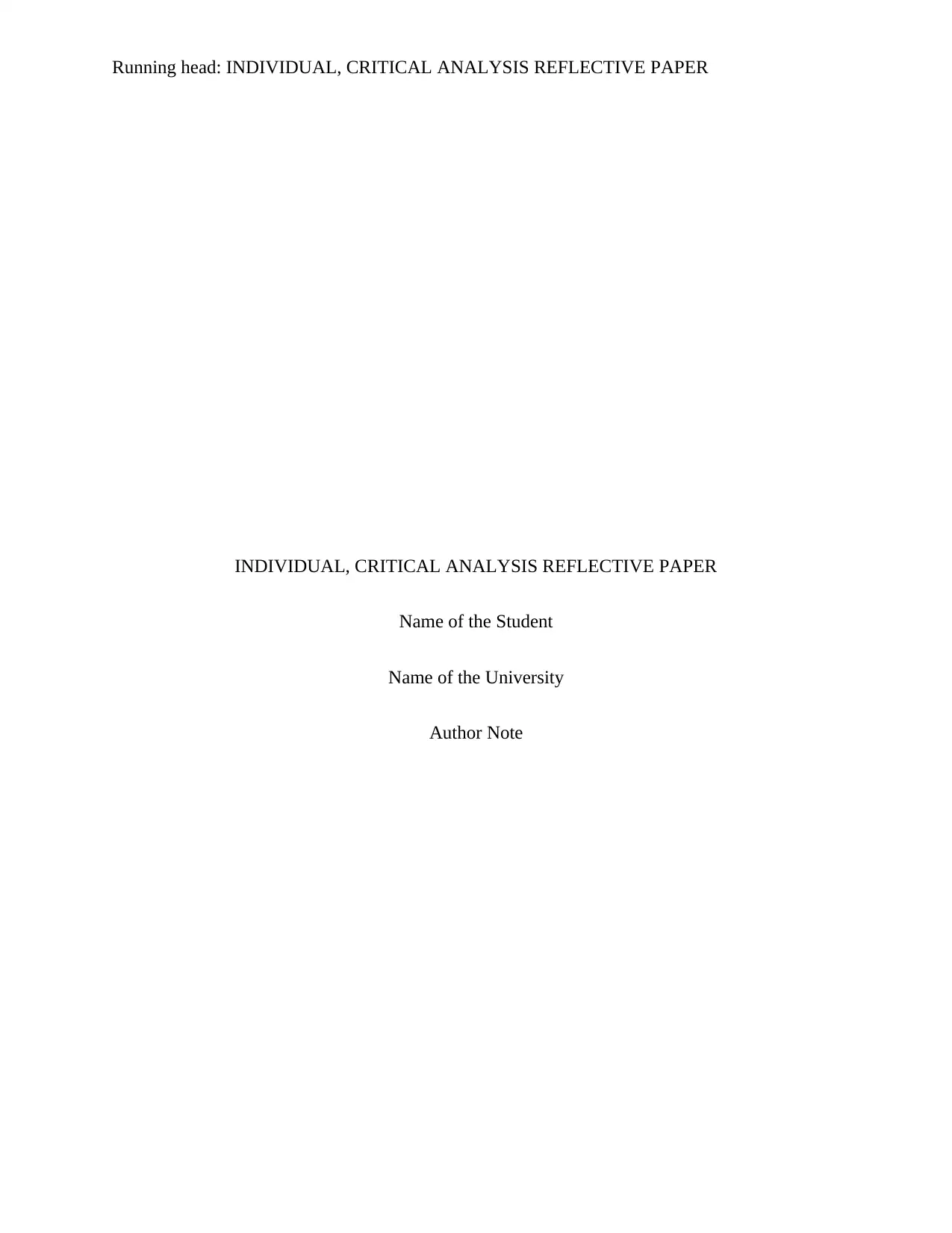
Running head: INDIVIDUAL, CRITICAL ANALYSIS REFLECTIVE PAPER
INDIVIDUAL, CRITICAL ANALYSIS REFLECTIVE PAPER
Name of the Student
Name of the University
Author Note
INDIVIDUAL, CRITICAL ANALYSIS REFLECTIVE PAPER
Name of the Student
Name of the University
Author Note
Paraphrase This Document
Need a fresh take? Get an instant paraphrase of this document with our AI Paraphraser
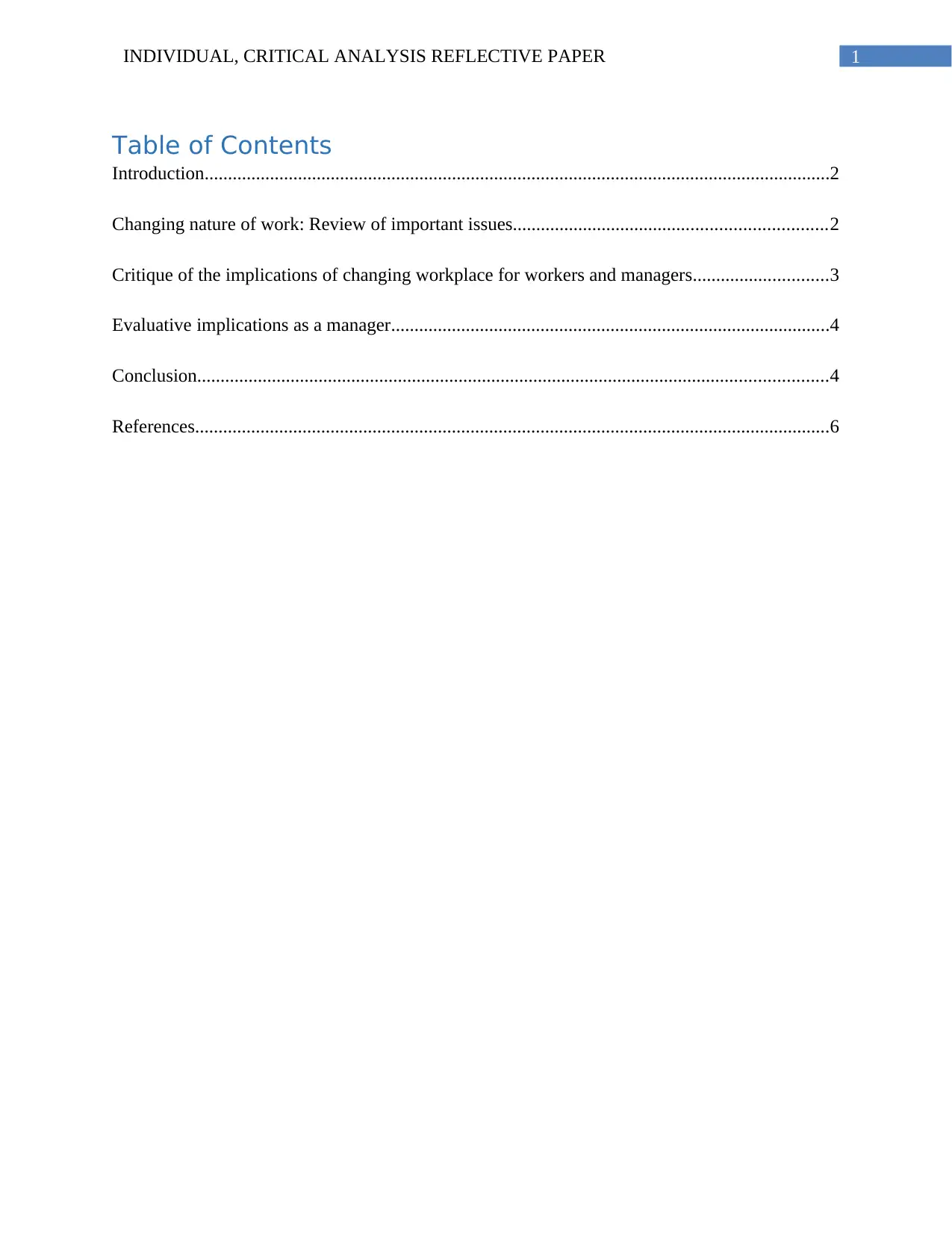
1INDIVIDUAL, CRITICAL ANALYSIS REFLECTIVE PAPER
Table of Contents
Introduction......................................................................................................................................2
Changing nature of work: Review of important issues...................................................................2
Critique of the implications of changing workplace for workers and managers.............................3
Evaluative implications as a manager..............................................................................................4
Conclusion.......................................................................................................................................4
References........................................................................................................................................6
Table of Contents
Introduction......................................................................................................................................2
Changing nature of work: Review of important issues...................................................................2
Critique of the implications of changing workplace for workers and managers.............................3
Evaluative implications as a manager..............................................................................................4
Conclusion.......................................................................................................................................4
References........................................................................................................................................6
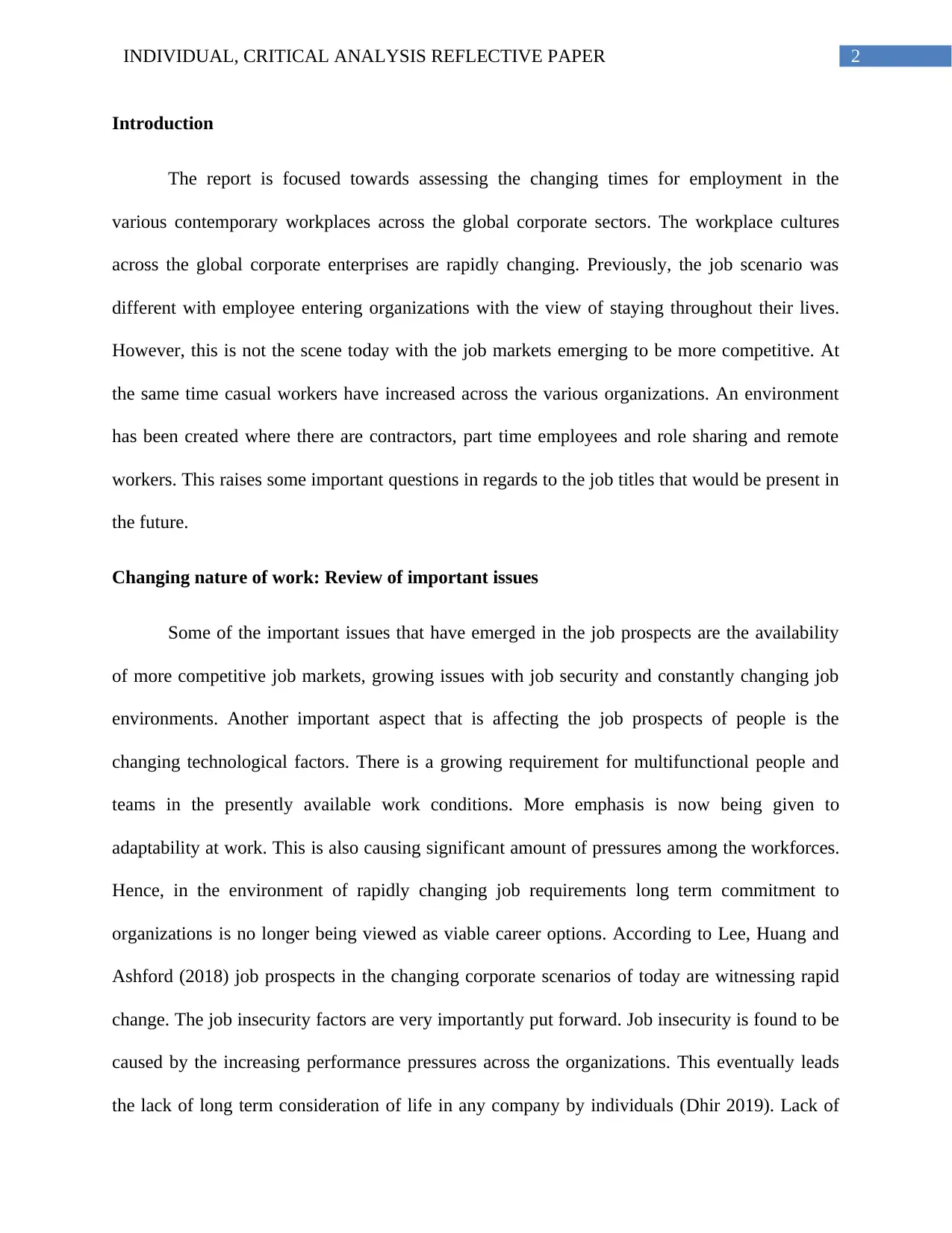
2INDIVIDUAL, CRITICAL ANALYSIS REFLECTIVE PAPER
Introduction
The report is focused towards assessing the changing times for employment in the
various contemporary workplaces across the global corporate sectors. The workplace cultures
across the global corporate enterprises are rapidly changing. Previously, the job scenario was
different with employee entering organizations with the view of staying throughout their lives.
However, this is not the scene today with the job markets emerging to be more competitive. At
the same time casual workers have increased across the various organizations. An environment
has been created where there are contractors, part time employees and role sharing and remote
workers. This raises some important questions in regards to the job titles that would be present in
the future.
Changing nature of work: Review of important issues
Some of the important issues that have emerged in the job prospects are the availability
of more competitive job markets, growing issues with job security and constantly changing job
environments. Another important aspect that is affecting the job prospects of people is the
changing technological factors. There is a growing requirement for multifunctional people and
teams in the presently available work conditions. More emphasis is now being given to
adaptability at work. This is also causing significant amount of pressures among the workforces.
Hence, in the environment of rapidly changing job requirements long term commitment to
organizations is no longer being viewed as viable career options. According to Lee, Huang and
Ashford (2018) job prospects in the changing corporate scenarios of today are witnessing rapid
change. The job insecurity factors are very importantly put forward. Job insecurity is found to be
caused by the increasing performance pressures across the organizations. This eventually leads
the lack of long term consideration of life in any company by individuals (Dhir 2019). Lack of
Introduction
The report is focused towards assessing the changing times for employment in the
various contemporary workplaces across the global corporate sectors. The workplace cultures
across the global corporate enterprises are rapidly changing. Previously, the job scenario was
different with employee entering organizations with the view of staying throughout their lives.
However, this is not the scene today with the job markets emerging to be more competitive. At
the same time casual workers have increased across the various organizations. An environment
has been created where there are contractors, part time employees and role sharing and remote
workers. This raises some important questions in regards to the job titles that would be present in
the future.
Changing nature of work: Review of important issues
Some of the important issues that have emerged in the job prospects are the availability
of more competitive job markets, growing issues with job security and constantly changing job
environments. Another important aspect that is affecting the job prospects of people is the
changing technological factors. There is a growing requirement for multifunctional people and
teams in the presently available work conditions. More emphasis is now being given to
adaptability at work. This is also causing significant amount of pressures among the workforces.
Hence, in the environment of rapidly changing job requirements long term commitment to
organizations is no longer being viewed as viable career options. According to Lee, Huang and
Ashford (2018) job prospects in the changing corporate scenarios of today are witnessing rapid
change. The job insecurity factors are very importantly put forward. Job insecurity is found to be
caused by the increasing performance pressures across the organizations. This eventually leads
the lack of long term consideration of life in any company by individuals (Dhir 2019). Lack of
⊘ This is a preview!⊘
Do you want full access?
Subscribe today to unlock all pages.

Trusted by 1+ million students worldwide
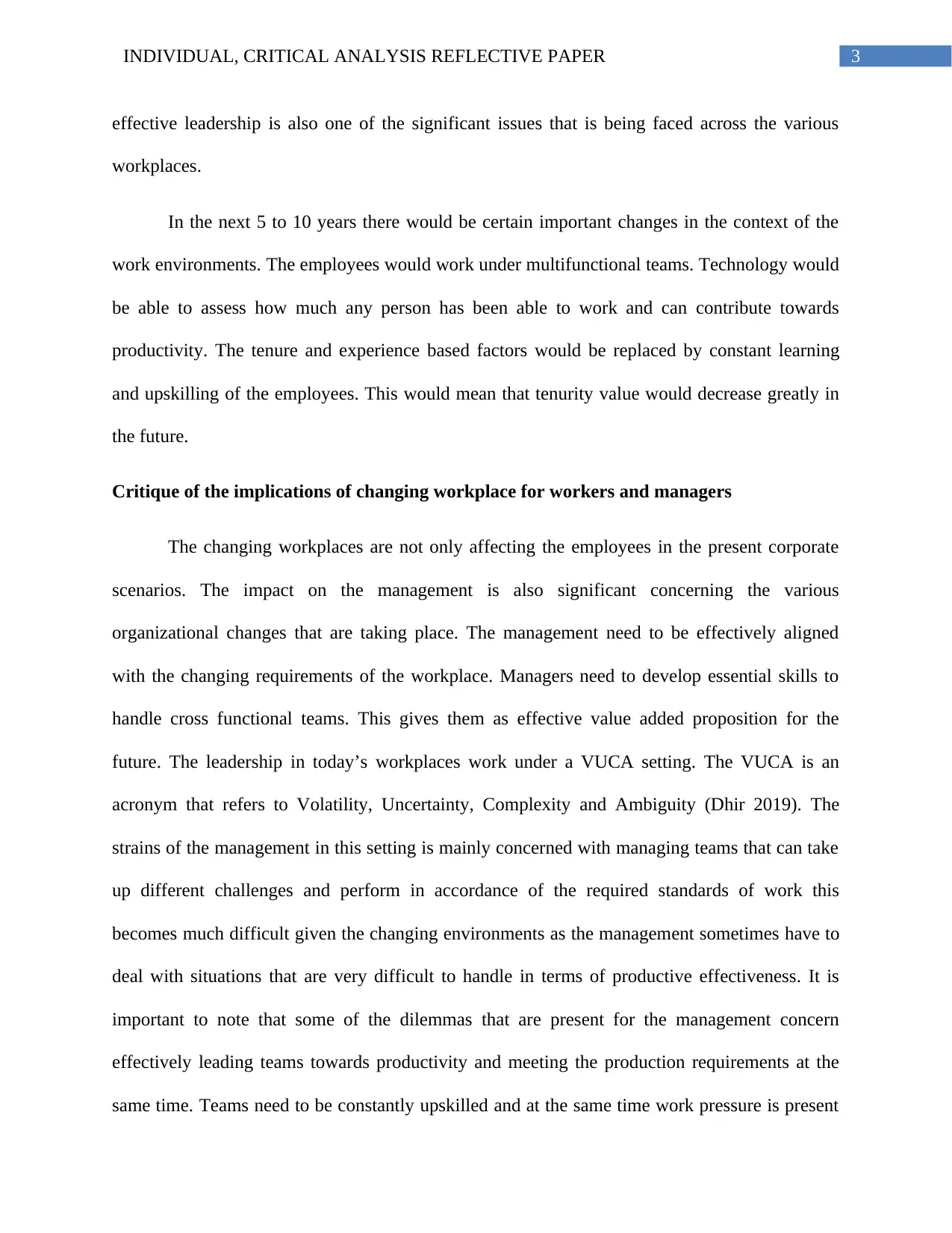
3INDIVIDUAL, CRITICAL ANALYSIS REFLECTIVE PAPER
effective leadership is also one of the significant issues that is being faced across the various
workplaces.
In the next 5 to 10 years there would be certain important changes in the context of the
work environments. The employees would work under multifunctional teams. Technology would
be able to assess how much any person has been able to work and can contribute towards
productivity. The tenure and experience based factors would be replaced by constant learning
and upskilling of the employees. This would mean that tenurity value would decrease greatly in
the future.
Critique of the implications of changing workplace for workers and managers
The changing workplaces are not only affecting the employees in the present corporate
scenarios. The impact on the management is also significant concerning the various
organizational changes that are taking place. The management need to be effectively aligned
with the changing requirements of the workplace. Managers need to develop essential skills to
handle cross functional teams. This gives them as effective value added proposition for the
future. The leadership in today’s workplaces work under a VUCA setting. The VUCA is an
acronym that refers to Volatility, Uncertainty, Complexity and Ambiguity (Dhir 2019). The
strains of the management in this setting is mainly concerned with managing teams that can take
up different challenges and perform in accordance of the required standards of work this
becomes much difficult given the changing environments as the management sometimes have to
deal with situations that are very difficult to handle in terms of productive effectiveness. It is
important to note that some of the dilemmas that are present for the management concern
effectively leading teams towards productivity and meeting the production requirements at the
same time. Teams need to be constantly upskilled and at the same time work pressure is present
effective leadership is also one of the significant issues that is being faced across the various
workplaces.
In the next 5 to 10 years there would be certain important changes in the context of the
work environments. The employees would work under multifunctional teams. Technology would
be able to assess how much any person has been able to work and can contribute towards
productivity. The tenure and experience based factors would be replaced by constant learning
and upskilling of the employees. This would mean that tenurity value would decrease greatly in
the future.
Critique of the implications of changing workplace for workers and managers
The changing workplaces are not only affecting the employees in the present corporate
scenarios. The impact on the management is also significant concerning the various
organizational changes that are taking place. The management need to be effectively aligned
with the changing requirements of the workplace. Managers need to develop essential skills to
handle cross functional teams. This gives them as effective value added proposition for the
future. The leadership in today’s workplaces work under a VUCA setting. The VUCA is an
acronym that refers to Volatility, Uncertainty, Complexity and Ambiguity (Dhir 2019). The
strains of the management in this setting is mainly concerned with managing teams that can take
up different challenges and perform in accordance of the required standards of work this
becomes much difficult given the changing environments as the management sometimes have to
deal with situations that are very difficult to handle in terms of productive effectiveness. It is
important to note that some of the dilemmas that are present for the management concern
effectively leading teams towards productivity and meeting the production requirements at the
same time. Teams need to be constantly upskilled and at the same time work pressure is present
Paraphrase This Document
Need a fresh take? Get an instant paraphrase of this document with our AI Paraphraser
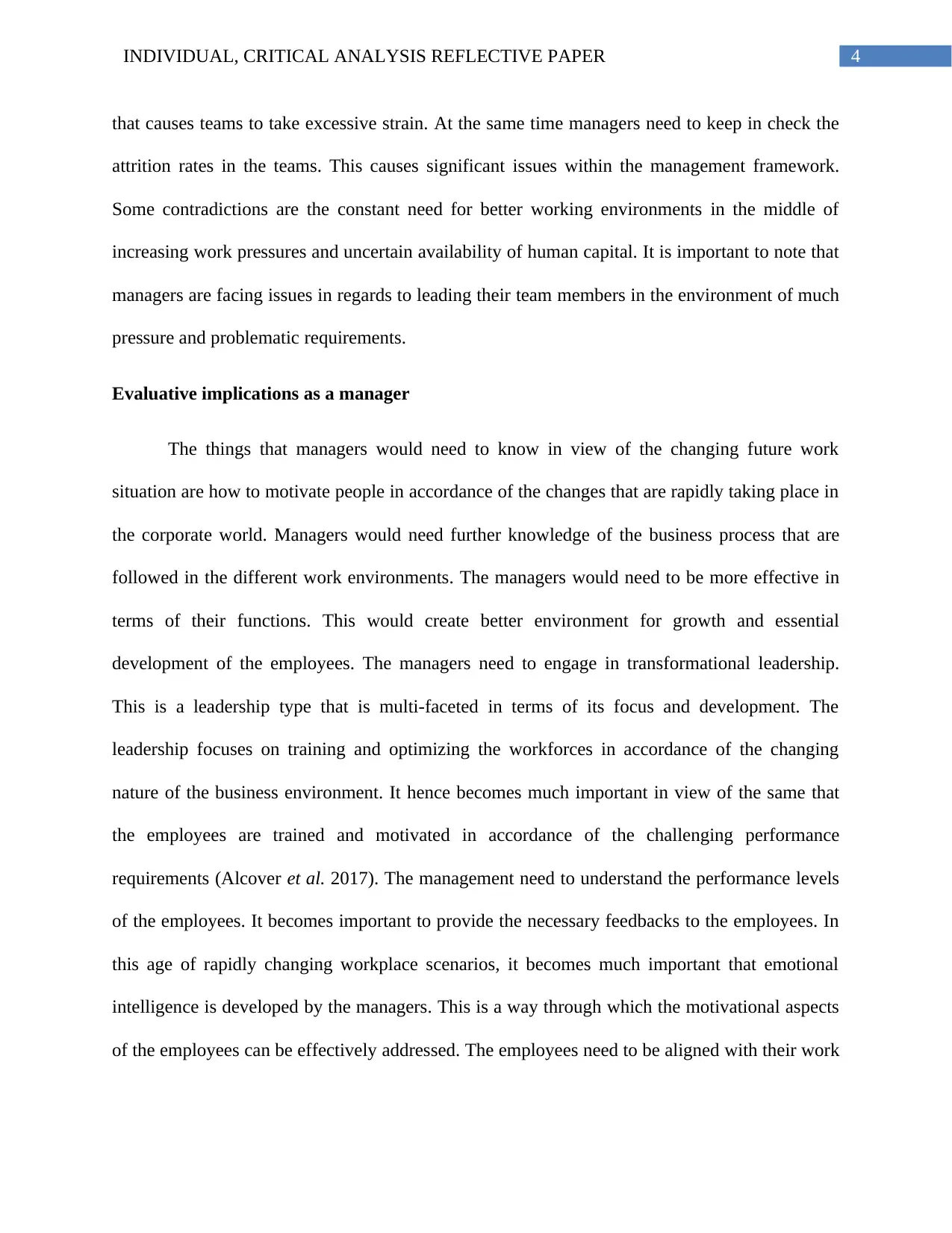
4INDIVIDUAL, CRITICAL ANALYSIS REFLECTIVE PAPER
that causes teams to take excessive strain. At the same time managers need to keep in check the
attrition rates in the teams. This causes significant issues within the management framework.
Some contradictions are the constant need for better working environments in the middle of
increasing work pressures and uncertain availability of human capital. It is important to note that
managers are facing issues in regards to leading their team members in the environment of much
pressure and problematic requirements.
Evaluative implications as a manager
The things that managers would need to know in view of the changing future work
situation are how to motivate people in accordance of the changes that are rapidly taking place in
the corporate world. Managers would need further knowledge of the business process that are
followed in the different work environments. The managers would need to be more effective in
terms of their functions. This would create better environment for growth and essential
development of the employees. The managers need to engage in transformational leadership.
This is a leadership type that is multi-faceted in terms of its focus and development. The
leadership focuses on training and optimizing the workforces in accordance of the changing
nature of the business environment. It hence becomes much important in view of the same that
the employees are trained and motivated in accordance of the challenging performance
requirements (Alcover et al. 2017). The management need to understand the performance levels
of the employees. It becomes important to provide the necessary feedbacks to the employees. In
this age of rapidly changing workplace scenarios, it becomes much important that emotional
intelligence is developed by the managers. This is a way through which the motivational aspects
of the employees can be effectively addressed. The employees need to be aligned with their work
that causes teams to take excessive strain. At the same time managers need to keep in check the
attrition rates in the teams. This causes significant issues within the management framework.
Some contradictions are the constant need for better working environments in the middle of
increasing work pressures and uncertain availability of human capital. It is important to note that
managers are facing issues in regards to leading their team members in the environment of much
pressure and problematic requirements.
Evaluative implications as a manager
The things that managers would need to know in view of the changing future work
situation are how to motivate people in accordance of the changes that are rapidly taking place in
the corporate world. Managers would need further knowledge of the business process that are
followed in the different work environments. The managers would need to be more effective in
terms of their functions. This would create better environment for growth and essential
development of the employees. The managers need to engage in transformational leadership.
This is a leadership type that is multi-faceted in terms of its focus and development. The
leadership focuses on training and optimizing the workforces in accordance of the changing
nature of the business environment. It hence becomes much important in view of the same that
the employees are trained and motivated in accordance of the challenging performance
requirements (Alcover et al. 2017). The management need to understand the performance levels
of the employees. It becomes important to provide the necessary feedbacks to the employees. In
this age of rapidly changing workplace scenarios, it becomes much important that emotional
intelligence is developed by the managers. This is a way through which the motivational aspects
of the employees can be effectively addressed. The employees need to be aligned with their work
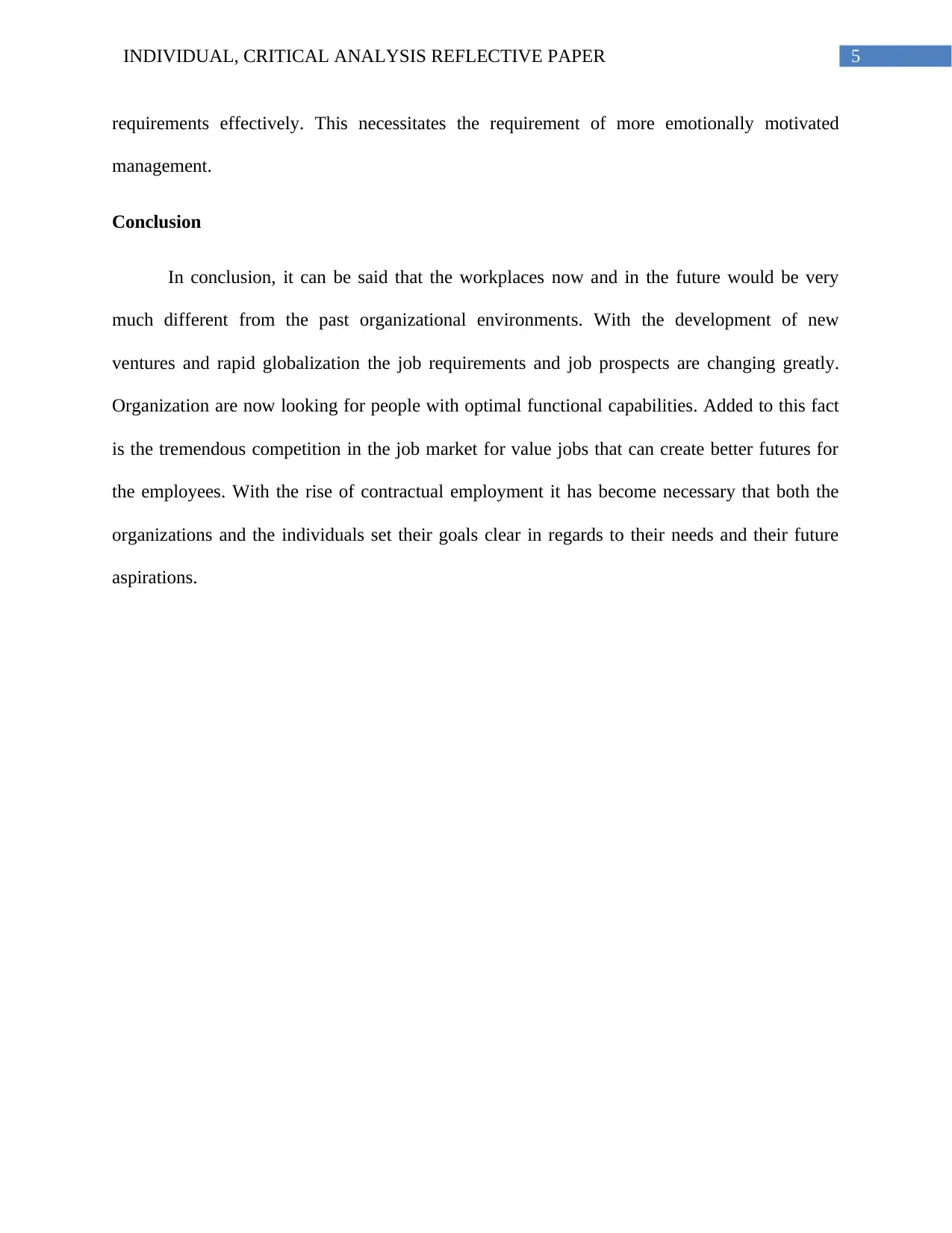
5INDIVIDUAL, CRITICAL ANALYSIS REFLECTIVE PAPER
requirements effectively. This necessitates the requirement of more emotionally motivated
management.
Conclusion
In conclusion, it can be said that the workplaces now and in the future would be very
much different from the past organizational environments. With the development of new
ventures and rapid globalization the job requirements and job prospects are changing greatly.
Organization are now looking for people with optimal functional capabilities. Added to this fact
is the tremendous competition in the job market for value jobs that can create better futures for
the employees. With the rise of contractual employment it has become necessary that both the
organizations and the individuals set their goals clear in regards to their needs and their future
aspirations.
requirements effectively. This necessitates the requirement of more emotionally motivated
management.
Conclusion
In conclusion, it can be said that the workplaces now and in the future would be very
much different from the past organizational environments. With the development of new
ventures and rapid globalization the job requirements and job prospects are changing greatly.
Organization are now looking for people with optimal functional capabilities. Added to this fact
is the tremendous competition in the job market for value jobs that can create better futures for
the employees. With the rise of contractual employment it has become necessary that both the
organizations and the individuals set their goals clear in regards to their needs and their future
aspirations.
⊘ This is a preview!⊘
Do you want full access?
Subscribe today to unlock all pages.

Trusted by 1+ million students worldwide
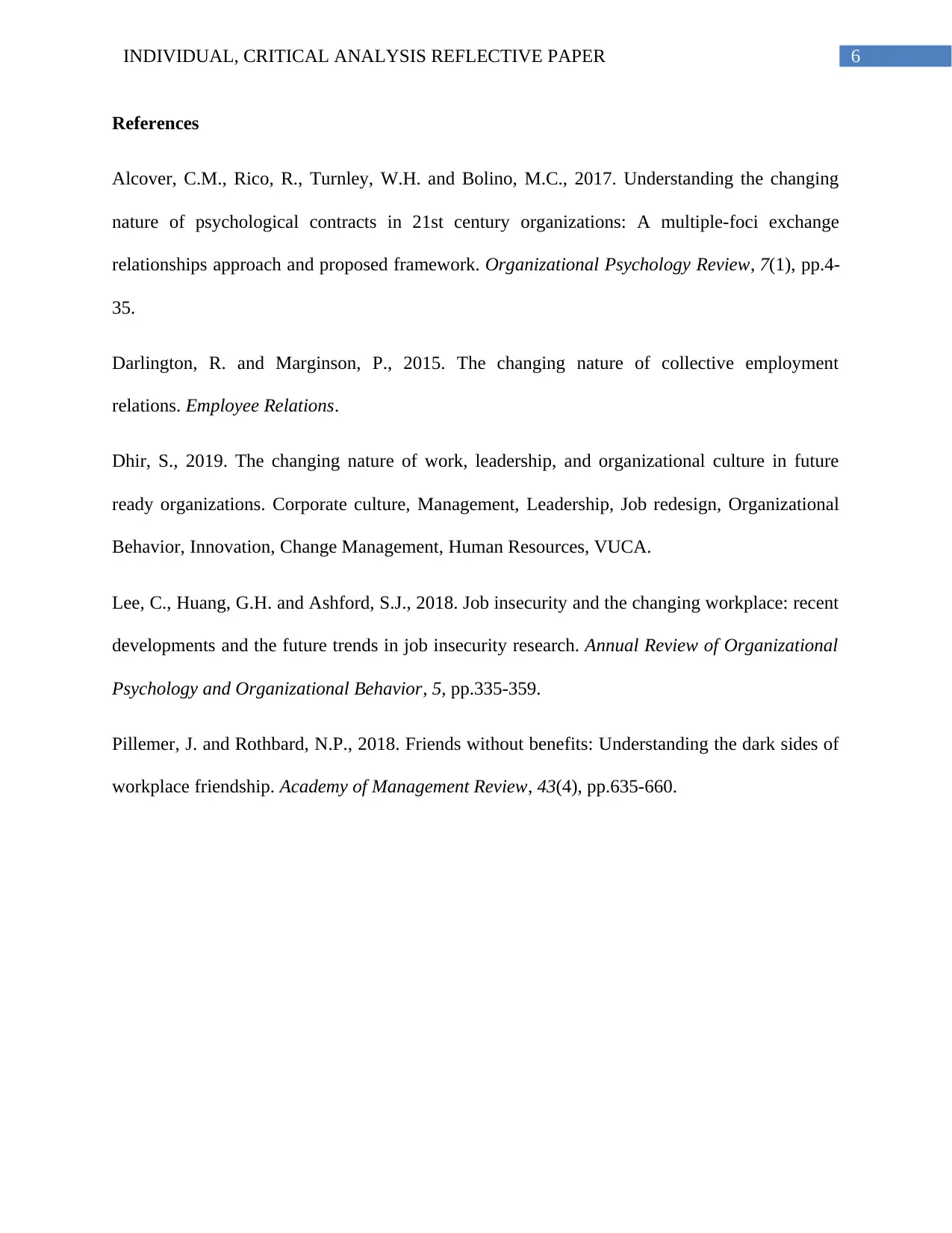
6INDIVIDUAL, CRITICAL ANALYSIS REFLECTIVE PAPER
References
Alcover, C.M., Rico, R., Turnley, W.H. and Bolino, M.C., 2017. Understanding the changing
nature of psychological contracts in 21st century organizations: A multiple-foci exchange
relationships approach and proposed framework. Organizational Psychology Review, 7(1), pp.4-
35.
Darlington, R. and Marginson, P., 2015. The changing nature of collective employment
relations. Employee Relations.
Dhir, S., 2019. The changing nature of work, leadership, and organizational culture in future
ready organizations. Corporate culture, Management, Leadership, Job redesign, Organizational
Behavior, Innovation, Change Management, Human Resources, VUCA.
Lee, C., Huang, G.H. and Ashford, S.J., 2018. Job insecurity and the changing workplace: recent
developments and the future trends in job insecurity research. Annual Review of Organizational
Psychology and Organizational Behavior, 5, pp.335-359.
Pillemer, J. and Rothbard, N.P., 2018. Friends without benefits: Understanding the dark sides of
workplace friendship. Academy of Management Review, 43(4), pp.635-660.
References
Alcover, C.M., Rico, R., Turnley, W.H. and Bolino, M.C., 2017. Understanding the changing
nature of psychological contracts in 21st century organizations: A multiple-foci exchange
relationships approach and proposed framework. Organizational Psychology Review, 7(1), pp.4-
35.
Darlington, R. and Marginson, P., 2015. The changing nature of collective employment
relations. Employee Relations.
Dhir, S., 2019. The changing nature of work, leadership, and organizational culture in future
ready organizations. Corporate culture, Management, Leadership, Job redesign, Organizational
Behavior, Innovation, Change Management, Human Resources, VUCA.
Lee, C., Huang, G.H. and Ashford, S.J., 2018. Job insecurity and the changing workplace: recent
developments and the future trends in job insecurity research. Annual Review of Organizational
Psychology and Organizational Behavior, 5, pp.335-359.
Pillemer, J. and Rothbard, N.P., 2018. Friends without benefits: Understanding the dark sides of
workplace friendship. Academy of Management Review, 43(4), pp.635-660.
1 out of 7
Related Documents
Your All-in-One AI-Powered Toolkit for Academic Success.
+13062052269
info@desklib.com
Available 24*7 on WhatsApp / Email
![[object Object]](/_next/static/media/star-bottom.7253800d.svg)
Unlock your academic potential
Copyright © 2020–2026 A2Z Services. All Rights Reserved. Developed and managed by ZUCOL.





